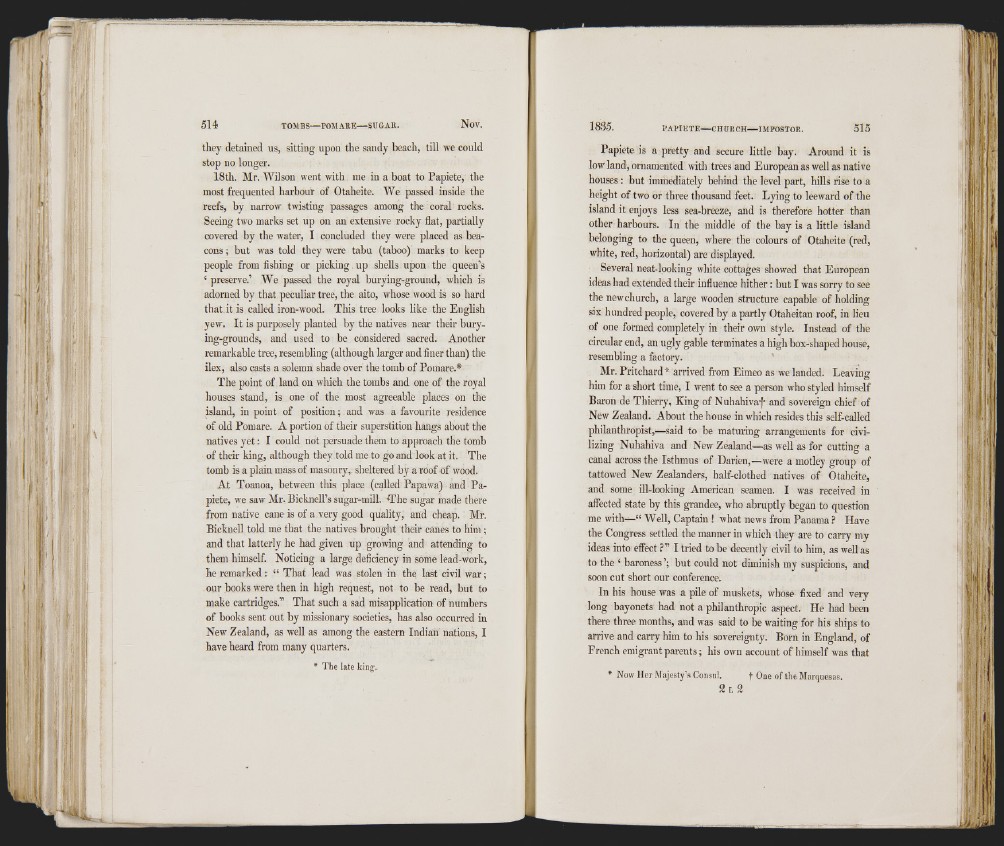
'7 ' "
ii 7'i
li
T’t
'l;
r.' :■ I
■h
>k Ir'M i
■i i \
)' it 11-, :! ,1 a!< fl
'i0|
n■; - 0I
514 TOMBS rOMAllE SUGAR. Nov.
they detained us, sitting upon the sandy beach, till we could
stop no longer.
18th. Mr. Wilson went with me in a boat to Papiete, the
most frequented harbour of Otaheite. We passed inside the
reefs, by narrow twisting passages among the coral rocks.
Seeing two marks set up on an extensive rocky flat, partially
covered by the water, I concluded they were placed as beacons
; but was told they were tabu (taboo) marks to keep
people from fishing or picking up shells upon the queen’s
‘ preserve.’ We passed the royal burying-ground, which is
adorned by that peculiar tree, the aito, whose wood is so hard
that it is called iron-wood. This tree looks like the English
yew. It is purposely planted by the natives near their bury-
ing-grounds, and used to be considered sacred. Another
remarkable tree, resembling (although larger and finer than) the
ilex, also casts a solemn shade over the tomb of Pomare.*
The point of land on which the tombs and one of the royal
liouses stand, is one of the most agreeable places on the
island, in point of position; and was a favourite residence
of old Pomare. A portion of their superstition hangs ahout the
natives y e t: I could not persuade them to approach the tomb
of their king, although they told me to go and look at it. The
tomb is a plain mass of masonry, sheltered by a roof of wood.
At Toanoa, between this place (called Papawa) and Pa-
prete, we saw Mr. Bicknell’s sugar-mill. "The sugar made there
from native cane is of a very good quality, and cheap. Mr.
Bicknell told me that the natives brought their canes to him;
and that latterly he had given up growing and attending to
them himself. Noticing a large deficiency in some lead-work,
he remarked : “ That lead was stolen in the last civil war;
our books were then in high request, not to be read, but to
make cartridges.” That such a sad misapplication of numbers
of books sent out by missionary societies, has also occurred in
New Zealand, as well as among the eastern Indian nations, I
have heard from many quarters.
* The late king-.
18,35. PAI'IHTE CHURCH IMPOSTOR. 515
Papiete is a pretty and secure little bay. Around it is
low land, ornamented with trees and European as well as native
houses : but immediately behind the level part, hills rise to a
height of two or three thousand feet. Lying to leeward of the
island it enjoys less sea-breeze, and is therefore hotter than
other harbours. In the middle of the bay is a little island
belonging to the queen, where the colours of Otaheite (red,
white, red, horizontal) are displayed.
Several neat-looking white cottages showed that European
ideas had extended their influence hither : but I was sorry to see
the newchurch, a large wooden structure capable of holding
six hundred people, covered by a partly Otaheitan roof, in lieu
of one formed completely in their own style. Instead of the
circular end, an ugly gable terminates a high box-shaped house,
resembling a factory.
Mr. Pritchard* arrived from Eimeo as we landed. Leaving
him for a short time, I went to see a person who styled himself
Baron de Thierry, King of Nuhahivaj- and sovereign chief of
New Zealand. About the house in which resides this self-called
philanthropist,—said to be maturing arrangements for civilizing
Nuhahiva and New Zealand—as well as for cutting a
canal across the Isthmus of Darien,—were a motley group of
tattowed New Zealanders, half-clothed natives of Otaheite,
and some ill-looking American seamen. I was received in
affected state by this grandee, who abruptly began to question
me with—“ Weil, Captain ! what news from Panama ? Have
the Congress settled the manner in which they are to carry my
ideas into effect ?” I tried to he decently civil to him, as well as
to the ‘ baroness ’; but could not diminish my suspicions, and
soon cut short our conference.
In his house was a pile of muskets, whose fixed and very
long bayonets had not a philanthropic aspect. He had been
there three months, and was said to be waiting for his ships to
arrive and carry him to his sovereignty. Born in England, of
French emigrant parents; his own account of himself was that
* Now Her Majesty’s Consul. f One of the Marquesas.
2 L 3
I '
*!l
I I
I i ,